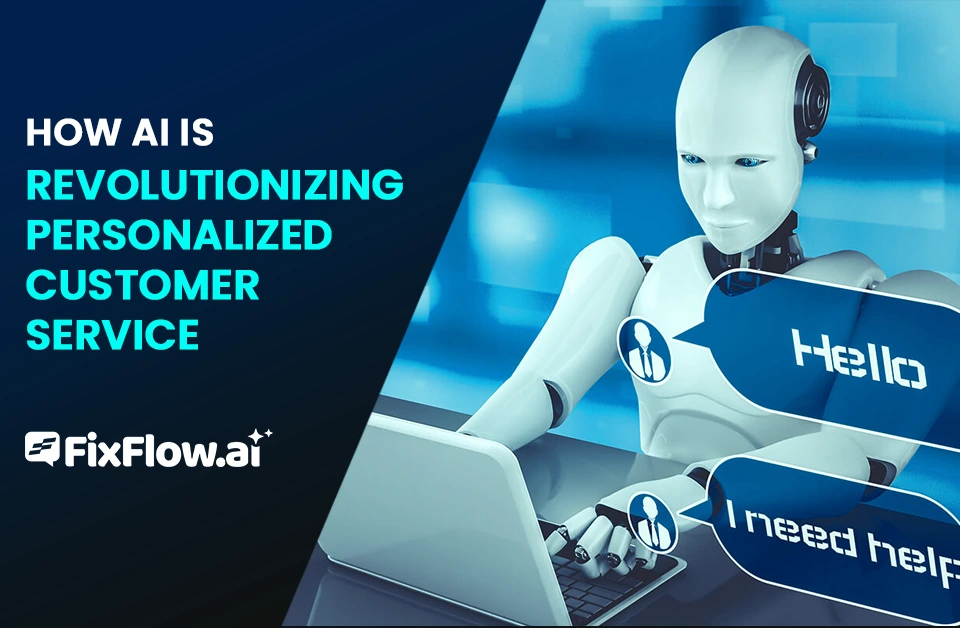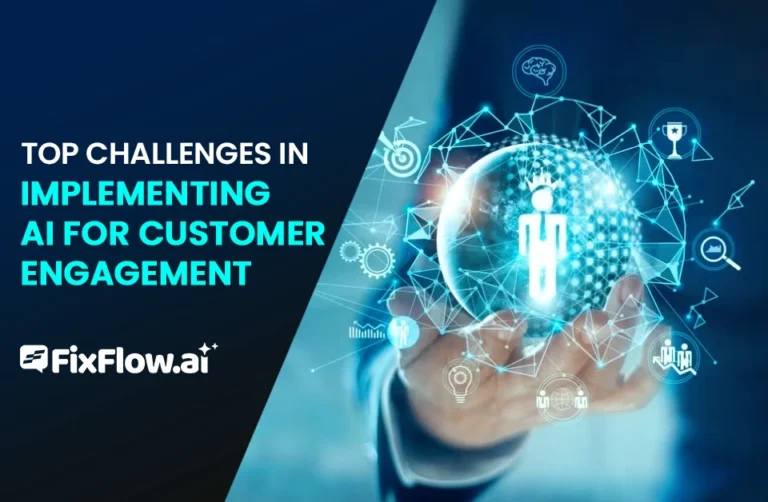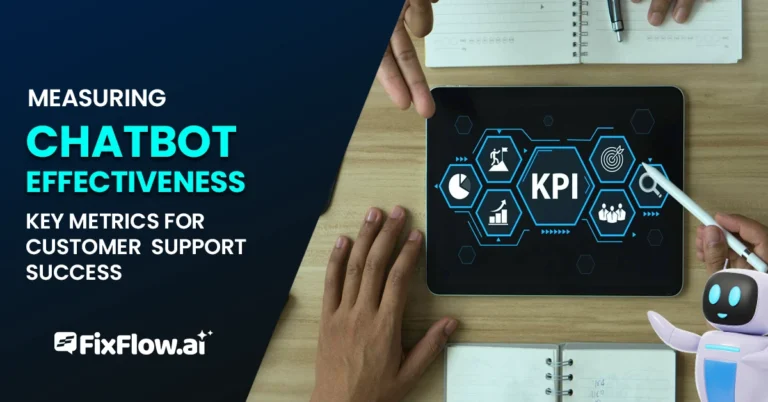How AI Is Revolutionizing Personalized Customer Service
AI is changing personalized customer service by offering hyper-personalized experiences and proactive problem-solving. You’ll see AI-driven chatbots providing real-time, tailored interactions that understand your context and intent. They empower you with self-service options, guaranteeing consistent support. Through predictive analytics, AI anticipates your needs, offering intuitive suggestions even before you express them. This shift from reactive to proactive service enhances your experience and builds loyalty. AI’s ability to analyze patterns in vast data makes every interaction meaningful. By streamlining communication, you ensure your needs are met before they become issues. Discover how these innovations are shaping the future of service.
Understanding AI in Customer Service
How exactly is AI reshaping the landscape of customer service to create more personalized interactions? At the heart of this transformation are AI-driven customer interactions. By utilizing machine learning in customer service, AI systems can efficiently collect and analyze vast amounts of data. This analysis enables businesses to understand customer preferences and behaviors on a deeper level, facilitating hyper-personalization in customer support. Imagine being able to predict a customer’s needs before they even express them—that’s the guarantee AI brings to the table.
How does AI manage this? Well, machine learning algorithms sift through customer data to identify patterns and trends. These insights allow businesses to anticipate what a customer might need next, crafting interactions that feel tailor-made. For instance, if you frequently purchase a particular product, AI might suggest complementary items just when you need them. This level of personalization guarantees that customer interactions are not just transactions but meaningful engagements.
Chatbots Enhancing User Experience
Building on AI’s capacity for hyper-personalization, chatbots are becoming indispensable tools in enhancing user experience by providing real-time, tailored interactions. These AI-powered chatbots utilize advanced algorithms to predict and respond to your needs instantly, making customer service more efficient and satisfying. With conversational AI for support, you’re not just getting automated answers; you’re engaging in a dialogue that feels natural and responsive. This technology understands context, sentiment, and intent, which means it can provide solutions that are both accurate and personalized, making you feel heard and valued as a customer.
AI-enhanced self-service is another area where chatbots shine. They empower you to find solutions on your own without needing to wait for a human representative. This not only saves you time but also makes the process more convenient. Whether you’re troubleshooting an issue or seeking product information, these chatbots guide you through every step with ease and precision. By incorporating AI-powered chatbots into their customer service strategies, businesses can guarantee you’re consistently receiving the support you need whenever you need it. The result? A seamless, engaging user experience that keeps you coming back for more.
Predictive Analytics for Personalization
Predictive analytics transforms customer service by anticipating your needs and providing tailored solutions before you even realize you need them. With AI’s ability to analyze vast amounts of data, businesses can offer you a level of personalization that’s both impressive and effective. By understanding patterns in your behavior and preferences, AI can make AI-driven recommendations that feel almost intuitive. Imagine shopping online and receiving suggestions that perfectly match not just what you want but what you didn’t even know you needed.
This predictive capability is a game-changer because it shifts customer service from reactive to proactive. It’s about meeting your needs in real-time and offering solutions that seamlessly align with your expectations. Hyper-personalization through AI means that every interaction you have with a company can be unique and specifically tailored to you. For example, instead of a generic email blast, you receive personalized offers that reflect your past purchases and browsing habits.
In essence, predictive analytics for customer needs ensures that businesses aren’t just responding to your requests but anticipating them. This approach not only enhances your experience but also builds a stronger, more loyal relationship between you and the brand.
Proactive Problem Solving
Leveraging AI for proactive problem-solving means anticipating customer issues and addressing them before they even arise. With the power of predictive analytics, AI can analyze patterns and trends in customer data, allowing you to foresee potential problems. This capability helps you offer AI-driven recommendations, ensuring that your customers receive proactive support tailored to their needs.
Imagine your business identifying common issues that customers face even before they contact you for help. Using AI, you can deploy solutions that address these problems, creating a smoother experience. For instance, if predictive analytics shows a rise in inquiries about a product feature, you can preemptively provide detailed guides or send personalized emails to address any confusion.
AI doesn’t just stop at predicting problems; it actively suggests solutions. When you integrate AI-driven recommendations into your customer service strategy, you empower your team to offer timely advice and support, enhancing overall satisfaction. It’s about being one step ahead, turning potential frustrations into seamless interactions. Embracing this approach not only improves efficiency but also demonstrates a genuine commitment to understanding and meeting your customers’ needs, setting your business apart in a competitive market.
Building Customer Loyalty With AI
AI can transform your customer relationships by fostering loyalty through personalized experiences. By leveraging AI-driven customer loyalty, you can create unique, tailored interactions that make your customers feel valued and understood. AI analyzes customer data to provide insights into preferences and behaviors, enabling you to offer personalized customer interactions that resonate on a deeper level. When customers feel like you truly understand them, they’re more likely to stay loyal to your brand.
Enhancing customer engagement is another key benefit of AI in building loyalty. By utilizing AI tools, you can anticipate customer needs and offer timely solutions. For example, AI can send personalized product recommendations or reminders based on past purchases, ensuring your customers always feel noticed and appreciated. This proactive approach not only solves problems before they escalate but also shows your commitment to providing an exceptional customer experience.
Additionally, AI can help streamline communication by offering personalized, instant support through chatbots and virtual assistants. These tools can efficiently handle common queries, freeing up your team to focus on more complex interactions that require a human touch. By integrating AI into your customer service strategy, you can cultivate lasting loyalty and strengthen customer relationships.
Frequently Asked Questions
How Does AI Ensure Data Privacy and Security in Personalized Customer Service?
You may be wondering how AI guarantees data privacy and security in personalized customer service. AI employs advanced encryption techniques to keep customer data safe. It constantly monitors for unusual activity, flagging potential breaches before they happen. Plus, AI systems comply with strict data protection regulations, ensuring your privacy rights are respected. It’s all about balancing personalization with the utmost respect for your data security so you can enjoy tailored experiences without worry.
What are the limitations of AI in understanding Nuances in customer emotions?
You’re probably wondering about AI’s struggles with understanding nuanced customer emotions. While AI can process vast amounts of data, it often misses the subtleties of human feelings. Emotions are complex, and AI systems might not always detect sarcasm, subtle disappointment, or cultural nuances. Sometimes, they lack the empathy a human can provide. This can lead to misunderstandings or impersonal interactions, reminding us that there’s still room for the human touch in customer service.
How Can Businesses Prevent AI Interactions From Becoming Too Intrusive?
To prevent AI interactions from becoming too intrusive, you must set clear boundaries for data collection. Focus on transparency by informing customers about how their data is used. Encourage feedback to understand comfort levels and adjust accordingly. Balance personalization with privacy to ensure interactions don’t feel invasive. Review AI algorithms regularly to avoid overstepping boundaries and maintain a human touch in customer service to foster trust and respect.
What Is the Cost of Implementing Ai-Driven Customer Service Solutions?
When you consider implementing AI-driven customer service solutions, costs can vary widely. Initial expenses include software development, integration with existing systems, and training. You might face ongoing expenses related to maintenance and updates. While it can seem pricey upfront, AI can save money long-term by reducing the need for extensive human labor and improving efficiency. Weigh these costs against the potential benefits to see if it’s the right investment for your business.
How Does AI Handle Customer Service in Multiple Languages and Cultures?
You’re wondering how AI manages customer service across languages and cultures. AI uses natural language processing to understand and respond accurately in various languages. It adapts to cultural nuances by analyzing data specific to each region. This means you’re getting responses that make sense and feel familiar, no matter where you are. With machine learning it constantly improves, ensuring your experience is seamless and culturally appropriate, enhancing global customer satisfaction.







